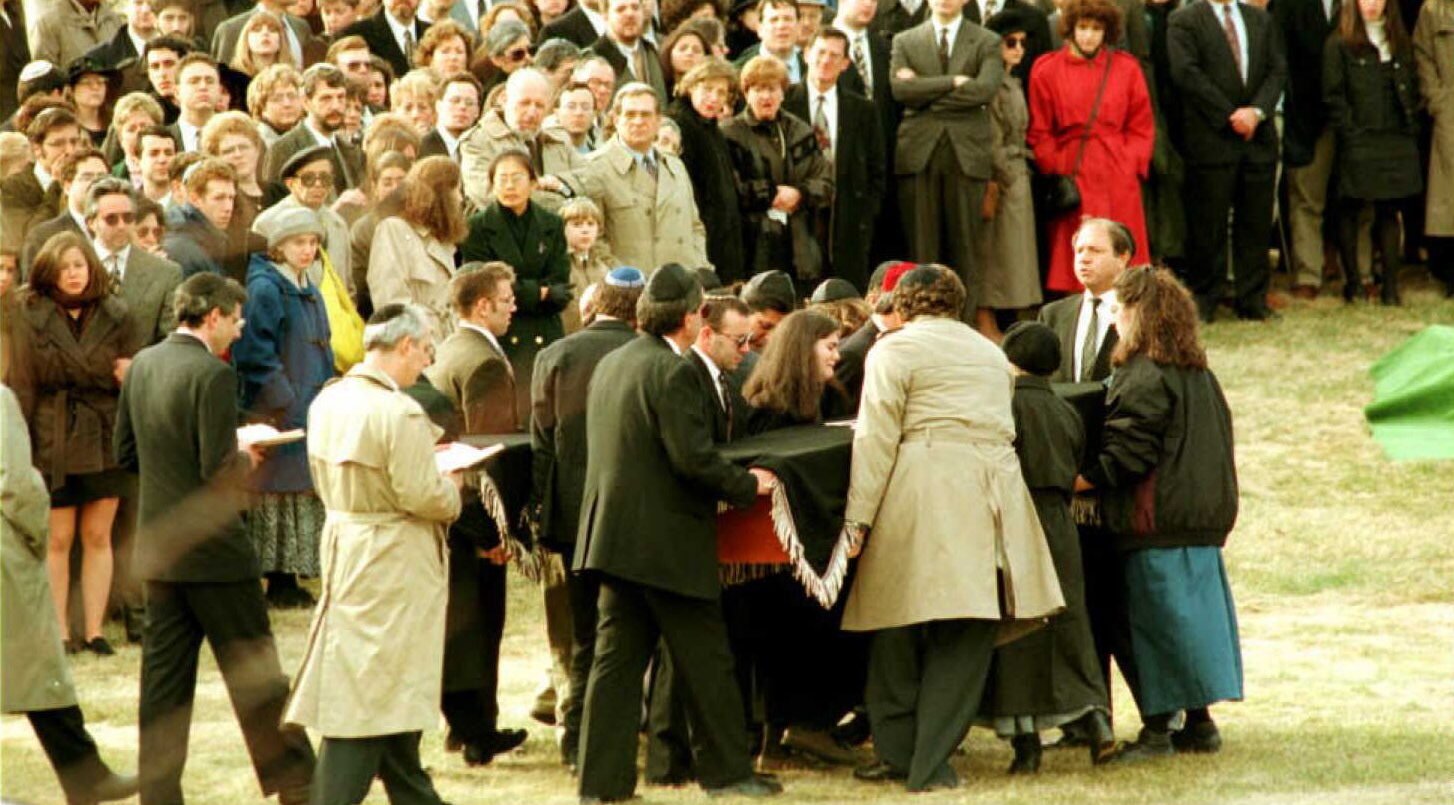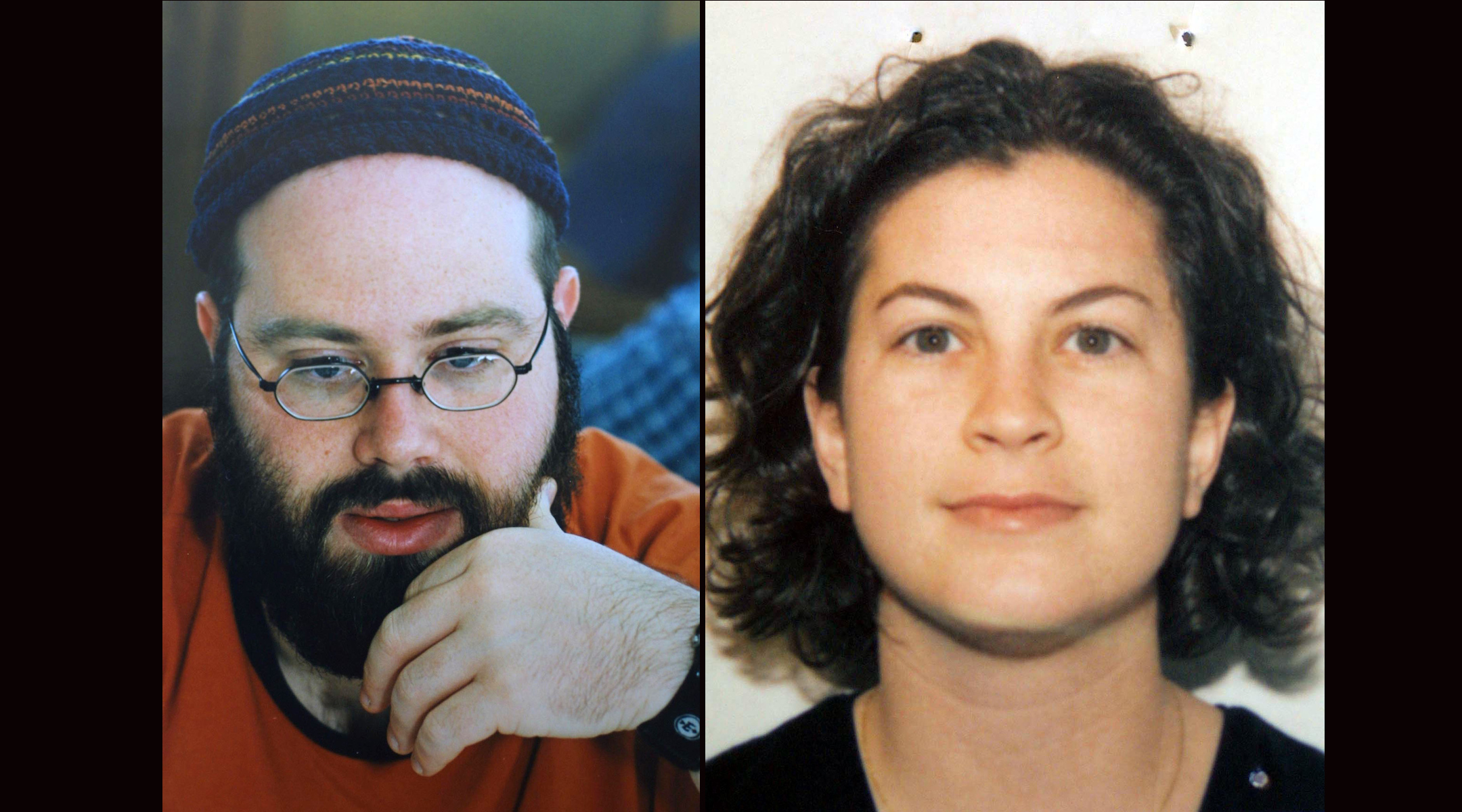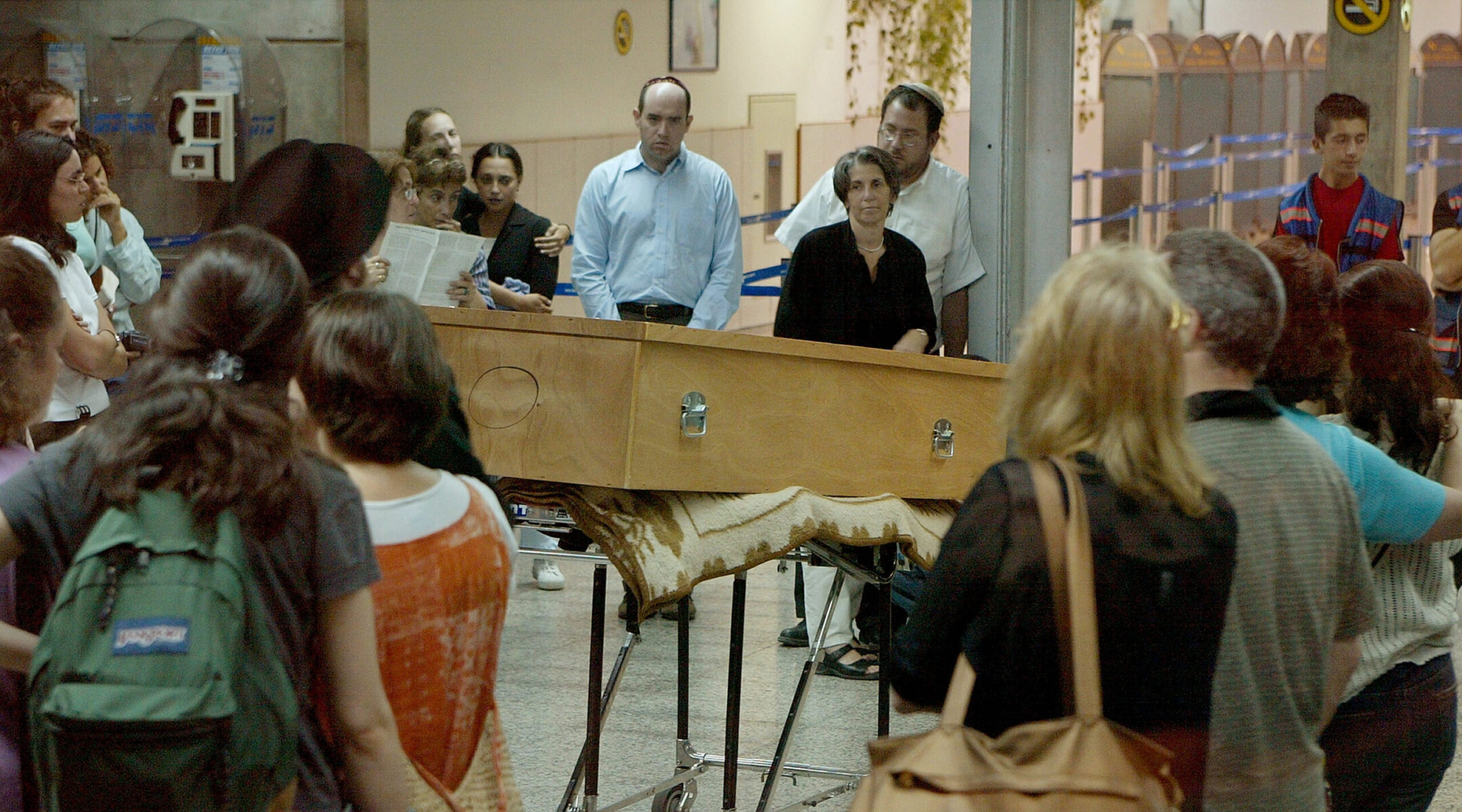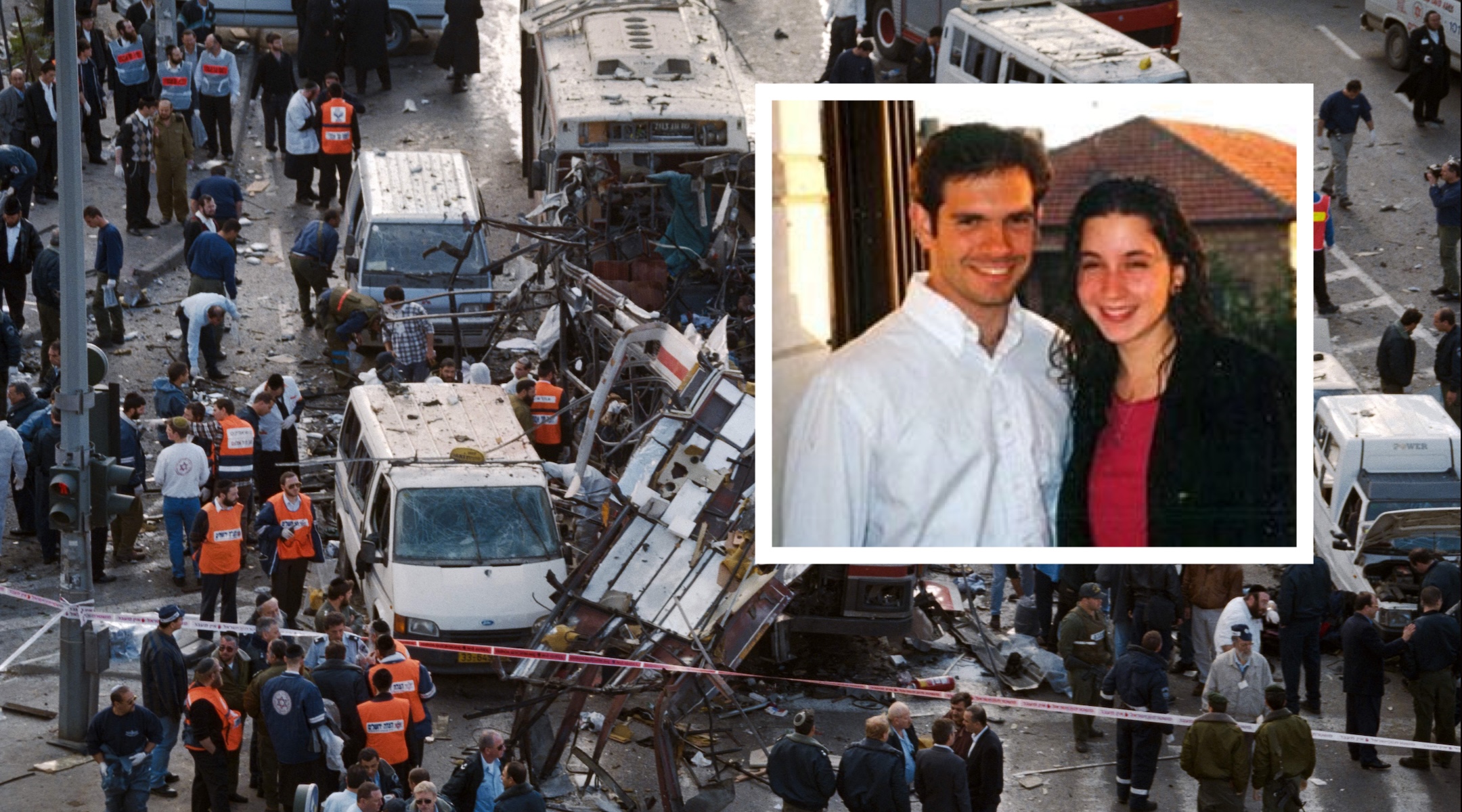Like many American Jews, Rabbi Shai Held has devoted considerable energy since Oct. 7, 2023, to praying for the release of the Israeli hostages taken by Hamas. Still, when Israel and Hamas struck a deal for some of them to be freed last month, he felt grief.
That’s because the deal required Israel to release nearly 2,000 Palestinian security prisoners — including the man convicted of murdering Held’s rabbinical school roommate.
“No matter what your perspective on the trade between Israel and Hamas, it is devastating and heartbreaking that this man gets his life back while Matt and Sara never will,” Held said.
Matt Eisenfeld and Sara Duker were 25 and 23, and on the verge of getting engaged, when a terrorist detonated a bomb inside their Jerusalem bus on Feb. 25, 1996, killing dozens.
Today, the study hall at the Jewish Theological Seminary, where Eisenfeld was a student, is named for the couple. And many of their contemporaries are — like Held, the president of the Hadar Institute — leaders of contemporary American liberal Judaism.
For them, the weeks since the ceasefire was announced have been emotionally turbulent. Even as they celebrate the release of the hostages, they are mourning their friends anew — and struggling with the injustice of seeing the killers go free.
“I surprised myself by bursting into tears when I read about some of the prisoners who would be released,” Rabbi David Wolkenfeld wrote on Facebook. “Somehow it had not occurred to me that people responsible for the deaths of people in my own close circles would be included.”

The coffins containing the bodies of Sarah Duker (front) and her boyfriend Matthew Eisenfeld (rear), who were killed in a Jerusalem bus bombing, are carried to the gravesite at the Beth El Cemetery in Avon, Connecticut, Feb. 25, 1996. Duker and Eisenfeld were buried next to each other. (Stephen Dun/AFP via Getty Images)
Wolkenfeld, the rabbi of Ohev Sholom Congregation in Washington, D.C., said news about which prisoners were to be released brought him back to the drumbeat of terror attacks against Israelis in the 1990s and during the second intifada, from 2000 to 2005.
“Being reminded of the staggering losses and unending grief from those years impacted me greatly,” he said.
Under the terms of the six-week ceasefire that began last month, Israel agreed to release 30 Palestinian prisoners for each civilian hostage and 50 for each female soldier Hamas freed.
The first security prisoners released were mostly women and teenage boys who had been charged but not convicted of crimes, or found guilty of offenses such as incitement that did not directly injure anyone. But as the ceasefire has proceeded, those released have included higher-profile prisoners, including many who were convicted of murder.
Freedom for Muhammad Abu Warda, convicted in connection with the 1996 bus bombing, was a “key demand” by Hamas, according to Samidoun, which advocates for Palestinian prisoners and has been sanctioned by the United States for raising funds for a terror group. He was serving 48 life sentences.

Benjamin Blutstein and Marla Bennett were among the students and staff killed in the bombing of Hebrew University’s cafeteria on July 31, 2002. (Getty Images)
Also released under the ceasefire was Wael Qassam, a Hamas leader convicted of orchestrating the July 31, 2002, bombing of the Hebrew University cafeteria in Jerusalem, as well as two co-conspirators, Mohammed Odeh and Wissam Abassi.
Among the nine people who died there were several Americans, including two, Benjamin Blutstein and Marla Bennett, who were jointly enrolled at Hebrew U. and the Pardes Institute of Jewish Studies.
“The planned release of the terrorist who was responsible for their murder together with 7 others at Hebrew University in 2002 weighs on us tremendously today,” Pardes, a frequent destination for Americans seeking to study Jewish texts in Israel in a coed space, posted on social media last month. “Marla and Ben were cherished members of our community, and their tragic absence continues to be deeply felt to this day.”
Amanda Pogany, then a Pardes student and Bennett’s best friend in Israel, said she had been blindsided by her reaction to the news about the terrorists’ release.
“I was surprised by how quickly I was transported back in time when I heard the news,” said Pogany, who today leads Luria Academy, a Jewish day school in Brooklyn. “The pain and the loss came flooding back — it really knocked me out.”
Bennett, 24, had been on the verge of becoming engaged to her boyfriend, Michael Simon, who today is the executive director of Northwestern University’s Hillel.
After the list of prisoners who would go free was published, Simon posted on Facebook that knowing Bennett’s killer was on it had deepened his feeling that the ceasefire deal’s unevenness was “troubling, even horrifying.” He said he felt that way even as he supported the deal, believing it would ease the suffering of Israelis and Palestinians.
“Even 22 years later, the pain is still real,” Simon wrote. “The price of this deal is not abstract, and it’s absurdly high. But I still want the hostages to come home — every single one of them. And I still want today’s suffering to end.”
He added, “Even though it’s so, so hard just to breathe.”
Rabbi Daniel Burg wrote on Facebook that learning that the Hebrew U. terrorists would be released took him back in time not to 2002, the year of the bombing, but 1996, when he studied abroad in Israel.

Friends of Marla Bennett, killed in a bombing at Hebrew University, grieve around her coffin during a memorial ceremony Aug. 3, 2002, at Ben Gurion Airport in Tel Aviv, Israel. (David Silverman/Getty Images)
“I’m transported to a magical junior year of college in 1996-1997, when peace between Israelis and Palestinians, a two-state solution, seemed like a real possibility,” he wrote. “That year, I discovered good friends, including Janis whom I dated for a time.”
He was referring to Janis Coulter, another American killed in the Hebrew U. bombing. Coulter had converted to Judaism in 1996 after studying in Israel. At the time of the bombing, she was working for the university’s Rothberg School of International Studies.
After learning that her killers would be released, Burg wrote that “intense feelings of loss, pain, anger, and sadness have come rushing back.” He also noted that among his congregants at Beth Am Synagogue in Baltimore are cousins of Blutstein, who was known for DJing at night before heading to Torah study in the morning.
Rabbi Ed Bernstein collected Eisenfeld’s and Duker’s writings on a range of topics into a “Love Finer than Wine,” a book released in 2016 ahead of the 20-year anniversary of their death.
Today a chaplain in Florida after working for decades in pulpits, he said hearing that Abu Warda would go free tempered an otherwise hopeful moment.
“Like many Israelis and Jews around the world, I am relieved to see hostages captured on Oct. 7 returning home. I pray that soon every single hostage will return home so that Israel can begin to heal from the trauma of Oct. 7. I also pray that the people of Gaza can rebuild and begin to heal,” Bernstein said.
“At the same time, I feel deeply angry that someone involved in the murder of my friends Matt and Sara is being freed,” he added. “It’s retraumatizing, and it’s not just. I’m holding all of these feelings simultaneously.”
For Pogany, the mix of emotions she is feeling this month, as she grieves Bennett’s death anew, is intense but not without precedent.
“As I’ve been trying to process it all I just keep thinking about how Jewish it all feels. We are a people that is constantly navigating joy and sorrow simultaneously,” Pogany said.
She added, “For now, I’m doing my best to ground myself in the joy of the return of the hostages, and doubling down on the work of raising a generation that is committed to bringing more kindness and even more joy into the world for all people.”
JTA has documented Jewish history in real-time for over a century. Keep our journalism strong by joining us in supporting independent, award-winning reporting.






